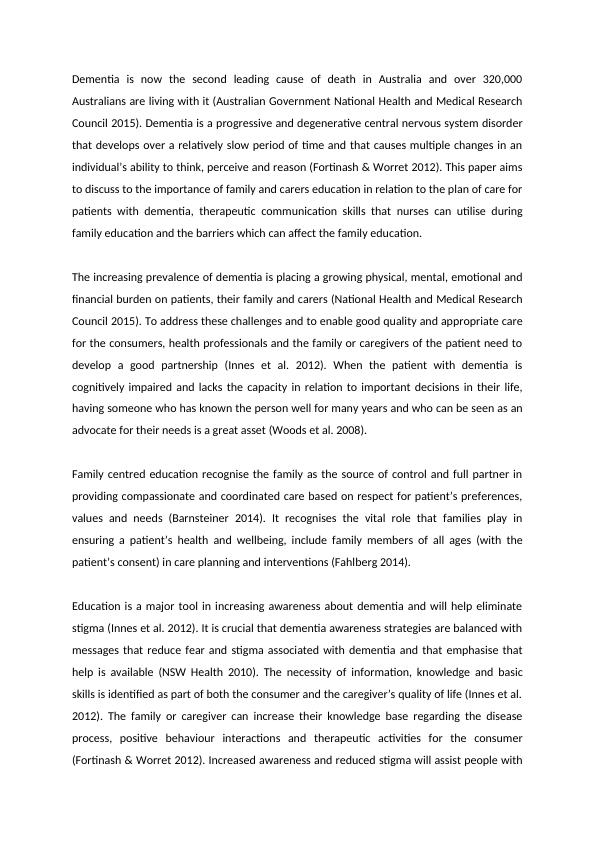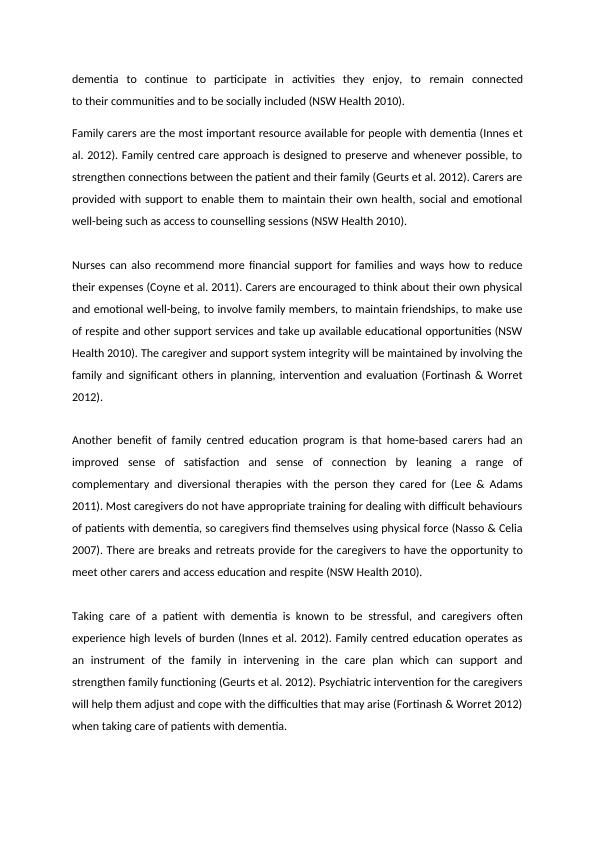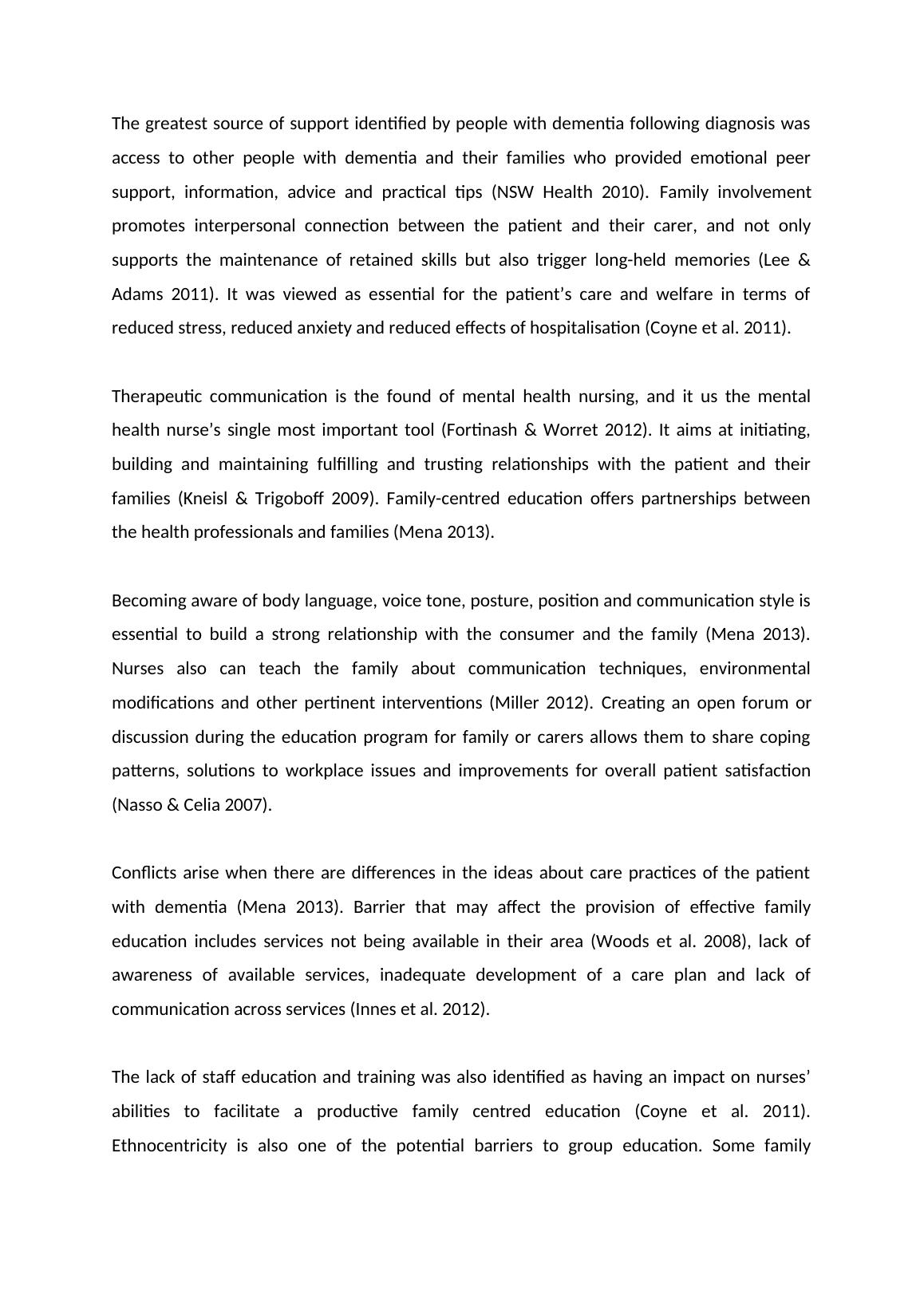Ask a question from expert
Importance of Family and Carers Education
7 Pages2129 Words210 Views
Added on 2020-09-08
Importance of Family and Carers Education
Added on 2020-09-08
BookmarkShareRelated Documents
Dementia is now the second leading cause of death in Australia and over 320,000Australians are living with it (Australian Government National Health and Medical ResearchCouncil 2015). Dementia is a progressive and degenerative central nervous system disorderthat develops over a relatively slow period of time and that causes multiple changes in anindividual’s ability to think, perceive and reason (Fortinash & Worret 2012). This paper aimsto discuss to the importance of family and carers education in relation to the plan of care forpatients with dementia, therapeutic communication skills that nurses can utilise duringfamily education and the barriers which can affect the family education.The increasing prevalence of dementia is placing a growing physical, mental, emotional andfinancial burden on patients, their family and carers (National Health and Medical ResearchCouncil 2015). To address these challenges and to enable good quality and appropriate carefor the consumers, health professionals and the family or caregivers of the patient need todevelop a good partnership (Innes et al. 2012). When the patient with dementia iscognitively impaired and lacks the capacity in relation to important decisions in their life,having someone who has known the person well for many years and who can be seen as anadvocate for their needs is a great asset (Woods et al. 2008).Family centred education recognise the family as the source of control and full partner inproviding compassionate and coordinated care based on respect for patient’s preferences,values and needs (Barnsteiner 2014). It recognises the vital role that families play inensuring a patient’s health and wellbeing, include family members of all ages (with thepatient’s consent) in care planning and interventions (Fahlberg 2014).Education is a major tool in increasing awareness about dementia and will help eliminatestigma (Innes et al. 2012). It is crucial that dementia awareness strategies are balanced withmessages that reduce fear and stigma associated with dementia and that emphasise thathelp is available (NSW Health 2010). The necessity of information, knowledge and basicskills is identified as part of both the consumer and the caregiver’s quality of life (Innes et al.2012). The family or caregiver can increase their knowledge base regarding the diseaseprocess, positive behaviour interactions and therapeutic activities for the consumer(Fortinash & Worret 2012). Increased awareness and reduced stigma will assist people with

dementia to continue to participate in activities they enjoy, to remain connectedtotheircommunitiesandtobe sociallyincluded (NSW Health 2010).Family carers are the most important resource available for people with dementia (Innes etal. 2012). Family centred care approach is designed to preserve and whenever possible, tostrengthen connections between the patient and their family (Geurts et al. 2012). Carers areprovided with support to enable them to maintain their own health, social and emotionalwell-being such as access to counselling sessions (NSW Health 2010).Nurses can also recommend more financial support for families and ways how to reducetheir expenses (Coyne et al. 2011). Carers are encouraged to think about their own physicaland emotional well-being, to involve family members, to maintain friendships, to make useof respite and other support services and take up available educational opportunities (NSWHealth 2010). The caregiver and support system integrity will be maintained by involving thefamily and significant others in planning, intervention and evaluation (Fortinash & Worret2012).Another benefit of family centred education program is that home-based carers had animproved sense of satisfaction and sense of connection by leaning a range ofcomplementary and diversional therapies with the person they cared for (Lee & Adams2011). Most caregivers do not have appropriate training for dealing with difficult behavioursof patients with dementia, so caregivers find themselves using physical force (Nasso & Celia2007). There are breaks and retreats provide for the caregivers to have the opportunity tomeet other carers and access education and respite (NSW Health 2010). Taking care of a patient with dementia is known to be stressful, and caregivers oftenexperience high levels of burden (Innes et al. 2012). Family centred education operates asan instrument of the family in intervening in the care plan which can support andstrengthen family functioning (Geurts et al. 2012). Psychiatric intervention for the caregiverswill help them adjust and cope with the difficulties that may arise (Fortinash & Worret 2012)when taking care of patients with dementia.

The greatest source of support identified by people with dementia following diagnosis wasaccess to other people with dementia and their families who provided emotional peersupport, information, advice and practical tips (NSW Health 2010). Family involvementpromotes interpersonal connection between the patient and their carer, and not onlysupports the maintenance of retained skills but also trigger long-held memories (Lee &Adams 2011). It was viewed as essential for the patient’s care and welfare in terms ofreduced stress, reduced anxiety and reduced effects of hospitalisation (Coyne et al. 2011).Therapeutic communication is the found of mental health nursing, and it us the mentalhealth nurse’s single most important tool (Fortinash & Worret 2012). It aims at initiating,building and maintaining fulfilling and trusting relationships with the patient and theirfamilies (Kneisl & Trigoboff 2009). Family-centred education offers partnerships betweenthe health professionals and families (Mena 2013).Becoming aware of body language, voice tone, posture, position and communication style isessential to build a strong relationship with the consumer and the family (Mena 2013).Nurses also can teach the family about communication techniques, environmentalmodifications and other pertinent interventions (Miller 2012). Creating an open forum ordiscussion during the education program for family or carers allows them to share copingpatterns, solutions to workplace issues and improvements for overall patient satisfaction(Nasso & Celia 2007).Conflicts arise when there are differences in the ideas about care practices of the patientwith dementia (Mena 2013). Barrier that may affect the provision of effective familyeducation includes services not being available in their area (Woods et al. 2008), lack ofawareness of available services, inadequate development of a care plan and lack ofcommunication across services (Innes et al. 2012).The lack of staff education and training was also identified as having an impact on nurses’abilities to facilitate a productive family centred education (Coyne et al. 2011).Ethnocentricity is also one of the potential barriers to group education. Some family

End of preview
Want to access all the pages? Upload your documents or become a member.
Related Documents
Dementia and Care Policies and Guidelineslg...
|11
|2610
|152
Cognitive Behavioral Therapy: What Is It and Who Can It Help?lg...
|5
|1015
|24
Dementia: Health Risk, Nursing Requirements and Factorslg...
|2
|865
|277
Collaborative Mental Health Nursing Practice with Healthcarelg...
|10
|2852
|355
Person-Centric Care: Competence and Professionalism in Nursinglg...
|7
|2200
|163
Discharge Planning for Angelolg...
|18
|5110
|447